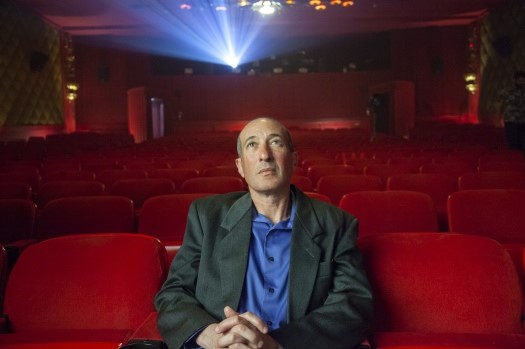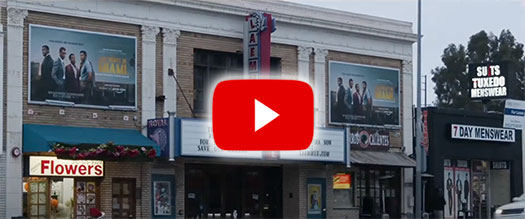Click to watch the trailer for 'Only in Theaters.'
By PETER LARSEN | plarsen@scng.com | Orange County Register
Via the LA Daily News
PUBLISHED: | UPDATED:
How the Laemmle family became the subject of ‘Only In Theaters’ documentary
Filmmaker Raphael Sbarge’s new documentary “Only In Theaters” tells the story of the family and the theaters that have influenced film and filmgoers since their first theater opened in 1938.

(Photo by Peter Bennett/Citizen of the Planet)
After Raphael Sbarge finished his first film, a short documentary on the Los Angeles River, he then focused on finding a theater to screen it.
Of course, he already knew where he wanted it to run, as he says in his new feature documentary, “Only In Theaters.”
“I included my story because it seemed to be kind of representative of a lot of filmmakers in Los Angeles,” Sbarge says. “Which is that if you want to show your film to an audience in L.A., everyone says you’ve got to go to the Laemmles.”
The Laemmle Theatres, which have eight locations around Southern California, have for decades had the reputation of the place to go for films outside the mainstream of Hollywood, from foreign films to documentaries, indie movies to short subjects.
“I called the theater and I got Greg Laemmle,” Sbarge says. “It was like, how wacky is that? You don’t necessarily call a business and get through to the person on the marquee.”
Laemmle booked the film, and as Sbarge got to know him and more of the Laemmle family lore, his imagination went to work.
“I was at the Royal theater,” he says of the Laemmle’s flagship cinema on Santa Monica Boulevard in West Los Angeles. “I walked past the wall, which is sort of a historical retelling of the family history done by a wonderful artist who assembled beautifully this sort of the poetry of the family.
“And I got very taken by the legacy story.”
A family business
The legacy of the Laemmle Theatres stretches back to 1938 when German-born brothers Max and Kurt Laemmle, nephews of Carl Laemmle, the founder of Universal Pictures, opened their first movie theater.
“Carl brought these two over and they worked at Universal for a bit, worked off their board, and then decided to go into the movie exhibition business,” Sbarge says. “So they bought a theater and then it built from there.”
About three years ago, Sbarge realized that Robert Laemmle – Max’s son, Greg’s father – was at 85 still involved in running the company. Furthermore, Alysse Laemmle – Kurt’s widow, and Greg’s great-aunt – was a lively storyteller at 103. Sbarge got his camera and set out to capture their stories “because of how priceless that was.”
Still, it wasn’t until mid-2019 that events within the company shifted and Sbarge saw an opening to tell a broader story as Greg Laemmle contemplated selling the family business and then the pandemic forced it to go dark for more than a year.
“It’s an 85-year-old theater, and arguably the most tumultuous two years of their history,” he says of the events unfolding as he filmed. “And he allowed it. Greg had no editorial control. The family had no editorial control.
“Greg saw it for the first time in front of an audience in Santa Barbara, which is where we world premiered it at festival,” Sbarge says. “Which was remarkable and speaks to his respect and honoring of film. He really said, ‘Come in, let’s do this. Let’s take the journey.’”
The access Sbarge had – sitting in meetings as the Laemmles considered offers for their theaters, talking via Zoom with Greg Laemmle as month after month passed during the pandemic – was a personal journey on many levels.
But in other ways, it was a story familiar to any independent theater owner in any town or city in the country, Sbarge says.
“This is a story about this arthouse cinema in Los Angeles,” Sbarge says. “And while they have they cast a long shadow, and many theaters look to Laemmle in terms of what they do, what they also are is representative of small theaters in towns all over the country.”
Even so, “Only In Theaters” is a story about family at its heart, he says.
“It was always the family that really felt like the spine of it,” Sbarge says. “This wonderful Jewish family who really cared deeply about art and culture and music and sort of the finer things. And what a remarkable thing that is, particularly in a world which is all about conglomeration, and you know, shareholders and how many likes we had and all these goofy things that have become so important at the moment.
“This was a legacy of things that matter. You know, that’s why I made this movie.”
Honest emotions
Sbarge, who grew up in New York City, has always been an actor, working in Broadway theaters or Hollywood soundstages since he was a boy. He first came to Hollywood at 19, when he landed his first movie role as one of Tom Cruise’s buddies in 1983’s “Risky Business.” More recently he’s been a regular on series such as “The Guardian,” “Once Upon A Time,” and “Murder In The First.”
What he realized over months of talking with Greg Laemmle and his wife Tish was that the couple had a natural quality of openness and emotional honesty that most actors work hard to achieve on every job.
Tish Laemmle is particularly moving in scenes where she describes hoping her husband will sell the business and be relieved of the stressful burdens of its operation.
Greg Laemmle talks of his hopes that his three 20-something sons won’t feel the pressure to join the family business as he had decades earlier, and of his fears that after choosing not to sell the theaters they might not survive COVID-19.
“Greg has an innate sense of just being present in a room that I think any actor would probably give their left leg for,” Sbarge says. “That’s who he is. You know, there are moments, during the pandemic, where we followed him around or we’re in a room with him, where you’d swear that there was no camera in the room because he’s just so focused on what’s at hand and he’s so himself.
“But that also goes to his character, and this family, and maybe a larger issue,” he says. “Which is that yes, this is a family in Hollywood who are without a doubt within the community and have greatly impacted and changed careers by virtue of what they’ve done in Hollywood.
“That said, they are in it, but not of it. There’s nothing affected. There’s nothing pretentious. Not a single scintilla of ‘Look at me!’ from Greg. He’s profoundly humble in a way.”
Laemmle also displays positivity and sense of humor, even in the depths of the pandemic. At one point in the film, there’s a montage of the Royal’s twin marquees on which Laemmle almost daily posted imaginary films showing in his closed cinema.
“Now Playing ‘Hope Springs’” the board read one day in 2020. “Coming Soon ‘Reality Bites.’ Or on a different day: “Now Playing ‘Leaving Normal’ next to ‘Coming Soon ‘Stranger Than Fiction.’
The hashtag #CoronaClosure marquees probably peaked with this one: “Now Playing ‘Groundhog Day,” “Coming Soon ‘Groundhog Day.’”
“That whole sequence in the film where he communicated with the outside world through sort of code on the marquee, it’s so eloquent and beautiful and poetic,” Sbarge says. “As a documentarian, you work hard to get people that you’re with to feel comfortable.
“But there is something very distinctly genuine about Greg and Tish that helped me enormously in that journey, and I think we captured that. That’s why it feels so personal.”
Sacred places
The affection and appreciation that filmmakers have for the Laemmle Theatres is clear in the many interviews Sbarge gathered from directors, writers and others, including Cameron Crowe, Nicole Holofcener, and Bruce Joel Rubin. Critics including Leonard Maltin and Kenneth Turan also appear.
“James Ivory was very eager to talk to us because, obviously, his whole life was about arthouse,” Sbarge said of the writer and director of such films as “A Room With a View,” “The Remains of the Day,” and “Call Me By Your Name.”
“Ava DuVernay was another person,” he says. “The reason why she spoke to me was because similarly, she had won the best film out of Sundance, and she needed to get some dates. And so she called the theater. Her story was very similar to mine.”
The film ends shortly after the Laemmle Theatres reopened in mid-2021. Hope is rising on the horizon, though the Laemmle Theatres, like movie theaters everywhere, are still not back to normal even now, Sbarge says.
“This is an L.A. story,” he says of the film that – appropriately – opens in Laemmle Theatres on Friday. “But this is a story that hits at the heart of cities all over the country, all over the world now.
“I hope it continues to remind people of how important theaters are,” Sbarge says. “How we come in as strangers and we leave as friends. And how the emotions, the laughter, the fright, the tears are magnified when you’re in a crowd or when you’re seeing it on a 40-foot screen.
“These are the magical parts of what the moviegoing experience is,” he says. “And so that’s the title, ‘Only In Theaters.’ I couldn’t believe that no one else had the title. It fit like Cinderella into the slipper shoes. It was perfect.
“It is a reminder of how important these are. These are temples. They are. They’re important for filmmakers and they’re important for audiences, too.”


